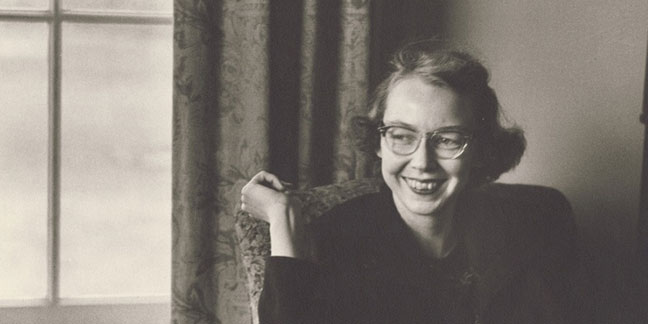March 25 marks the 98th birthday of the late Flannery O’Connor
 Flannery O’Connor is seen in this undated photo. (CNS | courtesy 11th Street Lot)Reading Flannery O’Connor requires a stout heart and a strong stomach.
Flannery O’Connor is seen in this undated photo. (CNS | courtesy 11th Street Lot)Reading Flannery O’Connor requires a stout heart and a strong stomach.
In her short life before she died of lupus, she wrote two novels and roughly two dozen short stories that continue to shock and unsettle us. With a wicked pen, she gleefully maims and kills off her characters in a million disturbing ways: They get drowned, hanged, run over by cars (twice in a row), wrapped in barbed wire and beaten to death. Her characters are prostitutes, pedophiles, arsonists, murderers, nihilists, and (worst of all for O’Connor), salesmen. But if you read her biography, she’s practically the patron saint of Catholic fiction: a devout, daily Mass Catholic who read St. Thomas Aquinas in her spare time and made a pilgrimage to the Shrine of Our Lady of Lourdes.
As readers, we wonder, “Is there something I’m missing?” How should we read O’Connor’s writing, and where is her faith in the pages of such brutal fiction?
Readers of O’Connor will notice that most of her stories follow one basic biblical narrative: St. Paul on the road to Damascus. Again and again, she depicts an event of searing violence in which divine grace shocks a hard-hearted, wicked or selfish person into a moment of recognition. In this terrible moment O’Connor offers her characters a choice, a flash of self-knowledge and an encounter with God that utterly burns away their illusions.
O’Connor does this best in one of my favorite tales, “Good Country People,” where she tells the story of Hulga, a nihilist with a Ph.D. in philosophy and a wooden leg. Convinced of the meaninglessness of life and that morality means nothing, the atheist Hulga lives consumed by pride and anger until she meets a traveling
Bible salesman who seduces her and steals her wooden leg, leaving her stranded and legless in the loft of a barn.
On his way down the ladder, the salesman sneers, “You ain’t so smart. I been believing in nothing ever since I was born!” Horrified to find a man who actually lives out the philosophy she claims to believe, Hulga now faces a pivotal choice as the story ends. And indeed the choice is ours as well: Do we accept this painful revelation of the truth, or do we return to a life of emptiness and sin? O’Connor’s tales do not always reveal what her characters decide: sometimes she leaves it to us to choose.
What O’Connor does in “Good Country People” is to reveal to Hulga (and to us) the true face of evil. O’Connor knew as she wrote her fiction that in an age of relativism we have lost a proper sense of right and wrong. Dulled by our own sins and by the de-Christianization of Western culture, we have lost the will and the ability to distinguish between good and evil. As she once wrote in an essay:
“When you can assume that your audience holds the same beliefs as you do, you can relax a little and use more normal means of talking to it; when you have to assume that it does not, then you have to make your vision apparent by shock – to the hard of hearing you shout, and for the almost-blind you draw large and startling figures.”
In a Western culture that accepts sin as personal preference and dismisses moral truth-claims as ideology or bigotry, modern man needs an arresting, visceral depiction of evil that can shock everyone into agreeing, “This is wrong.” For O’Connor, the logical extreme of godlessness is a pervert with a fetish for artificial body parts. As the Misfit, a serial killer in her story “A Good Man is Hard to Find,” says: “It’s nothing for you to do but enjoy the few minutes you got left the best way you can – by killing somebody or burning down his house or doing some other meanness to him. No pleasure but meanness….”
But we can see a deeper truth behind O’Connor’s terrific fictional violence: she wants to show us the way that Divine Providence can bring good even out of terrible evil. To many of us, the problem of evil remains perhaps the most compelling argument against the existence of a loving and all-powerful God. O’Connor answers this by showing how God incorporates the violent sins of men into His plan. In O’Connor’s novel “Wise Blood,” Hazel Motes, an atheist preacher of the “Church without Christ” runs over a rival prophet named Solace Layfield with his car. Although Layfield was only pretending to be a prophet to make money on street corners, he is forced to confront the ultimate things when he gets murdered by Motes. In his last moments, he confesses his sins and calls out the name of Jesus. Just minutes after working as a false prophet for three dollars a night, Layfield receives one of O’Connor’s famous wake-up calls and finally responds to grace. Little wonder, then, that she named him “Solace.”
In O’Connor’s fiction, God allows acts of violence to bring about spiritual healing in wounded and sinful characters because she believes that violent encounters strip away the nonessential and make us confront the Truth of things. “It is the extreme situation that best reveals what we are essentially,” O’Connor told an audience once. “The man in the violent situation reveals those qualities least dispensable to his personality, those qualities which are all he will have to take into eternity with him; and since the characters in this story are all on the verge of eternity, it is appropriate to think of what they take with them.”
There’s nothing like being about to die to help you reassess your priorities.
Finally, the events in O’Connor’s fiction should remind us that God brought about the redemption of all human beings precisely through permitting an act of unspeakable violence: the crucifixion of Jesus Christ. If God can bring cosmic victory out of the apparently senseless, spiteful torture and execution of His innocent Son, then He can, as St. Paul says in Romans 8:28, make “all things work together unto good.”
The truth is that the strange art of Flannery O’Connor will continue to puzzle and provoke us. As she once wrote, “We Catholics are very much given to the Instant Answer. Fiction doesn’t have any. It leaves us, like Job, with a renewed sense of mystery.” In her brief but fierce career as an American Catholic writer, O’Connor left us a vivid, challenging collection of works, her stark characters and plots standing out in sharp relief from the pages of her books. It’s a body of work not easy to encounter, but it’s one that is impossible to forget. So buckle up: If you read O’Connor’s stories of grace, the life you save may be your own.
Dr. Kelly Scott Franklin is a writer and associate professor of English at Hillsdale College. This article first appeared in Catholic World Report.
 CHARLOTTE — When Carolina Catholic Media launched its radio station AM 1270 four years ago, it filled a huge void in Catholic radio programming in the Carolinas.
CHARLOTTE — When Carolina Catholic Media launched its radio station AM 1270 four years ago, it filled a huge void in Catholic radio programming in the Carolinas.
An independent station, with an affiliation with the EWTN Global Radio Network, Carolina Catholic Radio’s 10,000-watt signal spans the greater Charlotte area, transmitting faith-filled programs to listeners each day. In addition, its livestreaming and on-demand capabilities attract listeners from countries around the world, as far away as Japan and the Philippines.
Founder David Papandrea says the idea for a radio station originated from a conversation he had with Spencer Swope, EWTN’s southeast regional marketing manager, when the two met in 2015 at the Charlotte Catholic Men’s Conference.
Swope told him the only places EWTN lacked area coordinators for their media missionary outreach were in the Charlotte and Raleigh areas. Papandrea, a career broadcaster, was looking for a new challenge and believes their meeting was divine providence.
Papandrea pulled together a board of directors from parishes across the region in 2016, incorporating Carolina Catholic Radio in 2017. “Even though we have this fast growing area of Catholicism here, we were dealing with people who didn’t know anything about EWTN or Catholic radio. Everything was basically an idea for local evangelization centered on the corporal and spiritual works of mercy. We had to market the idea without a tangible product,” he said.
The station signed on four years ago on Jan. 31, 2019, with EWTN Radio programming, also providing local news and information for about six minutes every hour.
The first feature locally produced program to hit the airwaves with local talent was “Faith and Sport” with Dr. John Acquaviva, an author and professor of exercise science at Wingate University.
Jason Murphy, coordinator of the annual Charlotte Catholic Men’s Conference, received a call from Papandrea in 2019 shortly after the station went on air, asking Murphy to tape some promos for the conference. “I had never done that and was uncomfortable at first,” Murphy said.
Papandrea pushed him out of his comfort zone a bit further by asking him to tape a series of reflections. He also asked Murphy to consider taping a weekly program geared toward men. The overriding motivation was to challenge our men daily and not “see you at the conference next year.”
Murphy has recently taped the 110th episode of “The Obligation,” his radio show that encourages men in their faith. “Men across the country are reaching out. I like hearing their conversion stories. I’m always trying to inspire men, reach men, and reawaken in them what we are called to be as husbands, fathers and men of God,” he said.
 Monsignor Patrick Winslow, vicar general and chancellor of the Diocese of Charlotte, is interviewed by Jason Murphy of Carolina Catholic Radio during “Catholic Night” at the Charlotte Knights ballpark at Truist Field on Sept. 9, 2022.St. Mark parishioners Jean Whelan and Kathleen Lewis, hosts of “Joyful Echo,” just aired their 100th episode. Friends for 25 years, the two had no experience in radio, but Papandrea learned of their love of the Catholic faith and their leadership and involvement with the Mary’s Women of Joy group at the Huntersville parish.
Monsignor Patrick Winslow, vicar general and chancellor of the Diocese of Charlotte, is interviewed by Jason Murphy of Carolina Catholic Radio during “Catholic Night” at the Charlotte Knights ballpark at Truist Field on Sept. 9, 2022.St. Mark parishioners Jean Whelan and Kathleen Lewis, hosts of “Joyful Echo,” just aired their 100th episode. Friends for 25 years, the two had no experience in radio, but Papandrea learned of their love of the Catholic faith and their leadership and involvement with the Mary’s Women of Joy group at the Huntersville parish.
They were hesitant about hosting a show at first, but after much prayer and discernment, they finally gave their fiat.
“We’re very devoted to Our Lady and we are just echoing our Magnificat through the radio show,” Whelan said. “We’re not scripted at all. We speak from the heart as we tape the program.”
Lewis added that “we talk about how Jesus touches our lives and how we respond to that echo.”
Whelan said there aren’t many places in everyday life where a woman can go to hear that they are precious to God, that He delights in her. “That’s not a message out in the world. If we can be a voice that is joyfully echoing that truth to women, we are happy to do it.”
Carolina Catholic Media also expanded its reach by getting out into the community. When the Diocese of Charlotte celebrated its 50th anniversary with “Catholic Night” at Truist Field Sept. 9 last year, they broadcast live, featuring an interview with Monsignor Patrick Winslow, vicar general and chancellor of the diocese.
“We’re hoping to spearhead more ‘Catholic Night’ events at other baseball parks across the diocese in the future,” Papandrea said.
While they are expanding programming, platforms and community reach, Carolina Catholic Media has a critical need for funding. The network was hit hard by the pandemic and forced to shut down radio operations for seven months, from August 2021 through February 2022, due to insufficient funding. As events were cancelled during the pandemic, fundraising became more difficult. The team was unable to reach out into the community to capitalize on those former opportunities to generate revenue.
“We are here to reflect our beautiful Carolina Catholic community,” Papandrea said. “You can tell when people call in how much of what we do impacts them. Some are fallen away Catholics, some agnostics, atheists… People from all walks of life are finding their way to us and hearing a positive message through our seven audio and video platforms. We need more people from our parishes, schools and ministries to partner with us to continue this important work like our recent March for Life live broadcast."
— SueAnn Howell
Tune in, get involved
Local programming on 1270AM is featured daily: 1-6 p.m. on weekdays, and 9 a.m.-6 p.m. on weekends.
Download the Carolina Catholic Media app to listen to programs live and on demand including sections on Prayer and Learning. Find out more on how you can donate or get involved at www.carolinacatholicmedia.org.
Questions? Email This email address is being protected from spambots. You need JavaScript enabled to view it..

